CES 2014: Phones morph into 'stun guns' and 'tricorders'
- Published
Yellow Jacket's case packs a 650,000 volt sting, and comes in a range of colours including pink
Add-ons that turn smartphones into Star Trek-like tricorder medical diagnostic kits, Predator-style thermal vision cameras and even electric "stun guns" are being promoted at the Consumer Electronics Show.
The inventions join a growing list of hardware that adds abilities to existing handsets.
Most will go on sale this year.
But one expert said the ambition of many was to see themselves taken over by one of the big manufacturers.
That is what happened to Authentec, which attended CES for several years before its fingerprint tech was acquired for use in Apple's iPhone 5S.
"If you come up with a good idea the reality is that you're going to get sold for a high price," explained Ben Wood from the tech consultancy CCS Insight.
"It's palpable here - you can feel there are people scouting the show floor desperately looking for that next big thing."
Tricorder tech
California-based Scanadu is already attracting attention before its first product's release.
Scanadu's scanner will be able to measure heart rate, skin and core body temperatures, respiratory rate and blood oxygen levels
The start-up is developing a health-checking scanner packed with sensors called Scout, which the user holds up to their head to let it check their vital signs.
It promises to be able to measure heart rate, skin and core body temperatures, respiratory rate and blood oxygen levels among other readings.
It has no screen of its own, but relies on a smartphone app to interpret the data in order to warn of potential problems or help its owner manage a chronic condition.
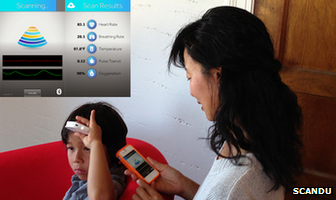
Scanadu's financial backers include Yahoo's founder Jerry Yang
At least that's the theory.
Although a prototype has been developed it's not fully functional yet. If and when the tech is shop-ready it will still need health regulators' approval to go on sale.
Even so, the firm's founder is already planning follow-ups.
"The Scanadu Scout is the first of many products to come," Walter De Brouwer told the BBC.
"Down the road we see consumers collecting all of their health data and even sharing it with each other to learn what works and what doesn't. This all happens through our smartphones.
"Right now we use our smartphone as a hub for our personal data - our emails, our photos, our entertainment, our fingerprints even. Why not use it for your health?"
While Scanadu tries to create an all-in-one Star Trek-like scanner, others are giving the smartphone more limited health powers.
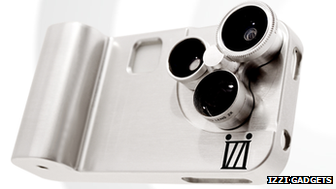
The Izzi Orbit Pro provides a selection of different lenses and a camera-style grip to help steady shots
San Diego's Sensor Jacket is at CES with a case that contains a "non-contact" infrared thermometer.
It suggests the device could appeal to the parents of newborns who want an easy-to-hand way of checking their temperature.
Sound and vision
As smartphones continue to decimate sales of standalone cameras and music players, several of the exhibitors are trying to enhance the handsets' capabilities.
Izzi Gadgets and Olloclip are both at CES with new cases that offer fisheye, wide-angle and macro lenses to increase the style of pictures that can be taken.
Flir Systems is attempting something even more radical.
The Flir One case produces a thermal image of cats and anything else put in front of it
The Oregon-headquartered firm has adapted the thermal imaging tech that it developed for US army helicopters and put it into an iPhone case.
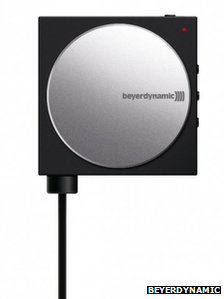
It promises potential purchasers a new way of looking at the world in which your cat is a psychedelic mix of yellows and pinks, and your child's eyes appear to glow.
Meanwhile Germany's Beyerdynamic is targeting audiophiles with its new A200p amplifier.
The gadget plugs into a phone's Micro-USB or Lightning cable slot to bypass the handset's own audio signal processing equipment and carry out the conversion process itself.
It offers a mind-boggling 135 different volume levels - and a steep price of $300 (£182), making it potentially more expensive than the phones it will be plugged into.
Touch my back
Other innovative products include Canopy's Sensus App-Enhancing case, which includes resistive force pressure sensors.
It allows users to control a handset by touching its product's back and sides, and can detect how firmly they are pressing. The company aims to ship the first copies later this year, but will require app developers to support the case for users to enjoy the benefits.
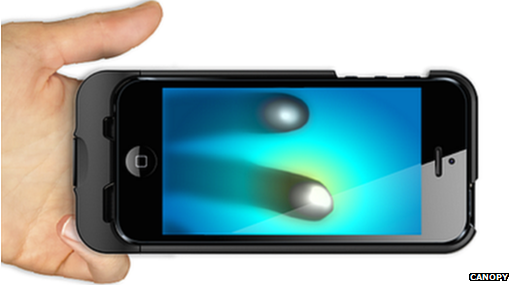
Canopy want to change the way we use our phones with its smartphone case
Fancy something a bit more extreme? Well, Yellow Jacket's case will turn your mobile into an electric stun gun.
The "self-defence" feature packs 650,000 volts - enough to provide an unpleasant sting rather than a Taser-like knock-out blow - and comes in a range of colours including pink.
Just beware, you could be arrested for owning one in the UK.
Battery bugbear
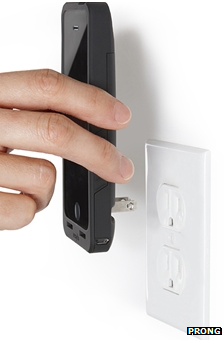
Prong lets a smartphone be plugged straight into a plug socket
The problem facing many of the manufacturers is that they either have to make your mobile bulky to include their own battery power or risk draining the life out of the handset.
"Advancements in battery technology are lagging the advancements in mobile telephony technology," explains Chris Jones from tech advisors Canalys.
"With many of the phones now using bigger, richer, higher resolution screens, if you plug in accessories or connect them via Bluetooth you will drain their battery pretty quickly."
Several firms are trying to turn this problem into an opportunity.
Mophie is one of the better known portable battery pack makers. Its latest version- unveiled at CES - is the Space Pack, which has the added benefit of offering extra storage to iPhones.
Prong has taken a different approach. Its PocketPlug case features two pop-out strips of metal that let a phone be plugged directly into the US mains.
There are various add-on wireless charging solutions on show too, to try and take the pain out of the problem.
But perhaps the most unusual solution comes from Salt Lake City's Power Practical.
Caleb Light demonstrates the 'Power Pot' at CES 2014
The firm has developed a camping cooking pot with a built-in electric thermogenerator that both cooks your food and simultaneously recharges your phone.
You need never go hungry for BBQ beans or another go on Angry Birds again.
Whether the likes of Samsung, Sony or Apple will be interested in the idea is another matter.